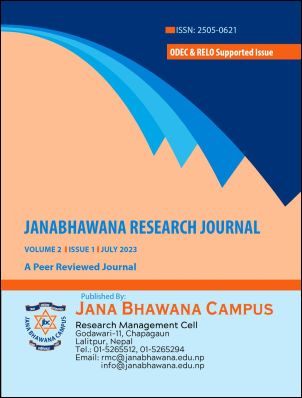'Catastrophic Experience' of Structural Violence in Sadat Hasan Manto’s “Toba Tek Singh”
DOI:
https://doi.org/10.3126/jrj.v2i1.57492Keywords:
structural violence, diplomacy, democracy, trauma, partitionAbstract
This paper aims to analyze, interpret, and examine the impact of structural violence in Sadat Hasan Manto’s story “Toba Tek Singh”. It particularly stresses the form of violence in which social structure or social institution harms the major character Bishan Singh by preventing him from meeting his basic needs of life, liberty, and pursuit of happiness. The political decisions forced him to leave the nation where he lived before. He was deprived of his rights to preserve his nationality and pursuit of happiness. This paper also explores how Bishan gets inflicted by the decisions imposed by the rules in the name of democracy and people’s aspiration; and traumatizes the people of his strata. Further, it exposes the patriotic feeling of the homeland and brotherhood relationship within the same territory. For this, the concept of trauma theory was employed to explore how the people suffered from the decisions of the nations and felt pain when the intense desire of the common people was suppressed and forced to abide by the unwise decisions. This article argues that Manto uses the setting of the mental asylum to show the structural violence that is inherent in the social, political, and economic systems of the newly formed nations of India and Pakistan. The study, thus, contributes to the readers to understand multidimensional impacts of structural violence and enforces the rulers to rethink their prudent decisions in the law-making process.
Downloads
Downloads
Published
How to Cite
Issue
Section
License
Copyright (c) 2023 Jana Bhanawa Campus, Research Management Cell

This work is licensed under a Creative Commons Attribution-NonCommercial 4.0 International License.
CC BY-NC: This license allows re-users to distribute, remix, adapt, and build upon the material in any medium or format for non-commercial purposes only, and only so long as attribution is given to the creator.




